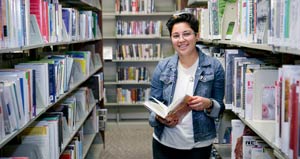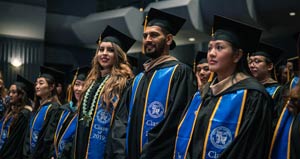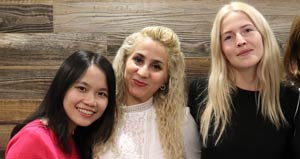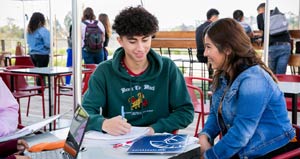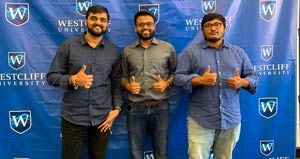Fulbright Specialist at the Universidad Nacional de Educación a Distancia (UNED) in Madrid, Spain
By Dr. Julie Ciancio
I recently had the opportunity to work as a Fulbright Specialist on several interconnected projects at the Universidad Nacional de Educación a Distancia (UNED) in Madrid, Spain. UNED has over 260,000 students and is the largest university in Spain and the second largest in Europe, with campuses in all of the Spanish states.
Firstly, I created three out of 11 videos for an English for Tourism Massive Open Online Course (MOOC). The video lessons I created were on: nouns, verbs, and sentences and word order. The other faculty involved in this project created similar videos on other grammar topics; however, they spoke in Spanish. The team was happy to have me on board in order to be able to provide a model of a native-speaker of English inside the course. For these videos, I created the PowerPoint lecture and then recorded the corresponding lessons in the UNED studios.
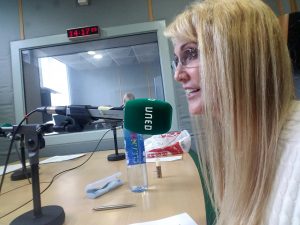
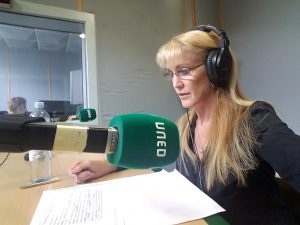
It was a valuable and interesting experience for me to be able to work in UNED’s professional video recording studio. They have a very competent staff with a lot of experience in producing high-quality videos for online courses. The MOOC we created ran from November 14- December 18, 2017. There were 1,250 students registered in the MOOC.
Secondly, I revised a PowerPoint lesson that had been created by my counterparts at my host institution and recorded a video for an English for Specific Purposes (ESP) course for tourism that addressed the main questions that students had had during previous offerings of the course. The tips focused on some English grammar points and how to best take advantage of some of the features available on the online platform. Depending on the particular needs of the students, ESP courses are usually taught in the mother tongue and focus on techniques to aid students to be able to utilize the target language in limited domains but with high levels of proficiency in those sub-skills. For this English for Tourism course, the focus was on the grammar, vocabulary, and register required to work in the tourism industry. In my opinion, the course was a bit heavy on the grammar focus. I would have liked to have seen more emphasis placed on oral communication, despite the fact that that is difficult to implement in an online course. Also, it might be a nice addition to see what applications and technology students could learn about that can be incorporated to aid in English for tourism.
Thirdly, I translated the SistemaArt-text templates for the English for Tourism text genres from Spanish to English and also developed and recorded a lengthy video class on the five most important and at the same time the most difficult genres in tourism. This video will be posted in the MOOC as well as on the UNED homepage. SistemaArt-text was primarily created by one of the co-authors of the MOOC. Artext is a free online text editor in the format of a dynamic template that provides structure to students’ writing by supplying the appropriate section headings, lexicon, and sentence frames, that are typical of different genres of texts found in three disciplines: medicine, public administration, and tourism. To take a look at the platform, please see http://sistema-artext.com/.
Fourthly, together with another one of the members involved in the project, I made audio recordings of the dialogues for the English for Tourism textbook. This was also a very interesting experience for me. UNED has a professional sound recording studio, sound engineers, and radio station, where we were able to make these recordings and have them engineered for professional quality. It was fun to be able to be the voice in the dialogs of a textbook after so many years of being a teacher and listening to other dialogs in books I have taught from.
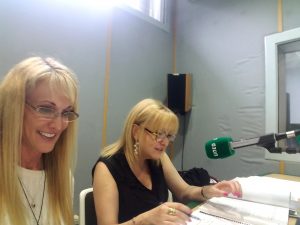
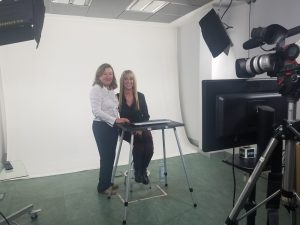
Finally, I revised and gave input on the presentation one of the co-authors had developed about this MOOC project to present the paper “Revisiting tourism text genres presenting writing difficulties to students: designing materials through a semi-automatic corpus” at the “International ESP Conference on Convergence of ESP with Other Disciplines” in Liverpool, England on October 27-28, 2017.
In the future, I will participate with the other authors of the project to collect data and publish on this project. In addition, these co-authors are valuable resources that I intend to invite to participate the next time we develop a MOOC for Westcliff University. We ordinarily create MOOC projects in response to requests for proposals from US State Department or other government initiatives, so this will now give us an opportunity to create wonderful multi-national cooperative projects. Furthermore, we would like to invite my counterparts in Spain to come to Westcliff University as visiting scholars in the future. It is always nice to collaborate internationally as both sides learn quite a bit from the exchange of ideas, attitudes, and practices.

